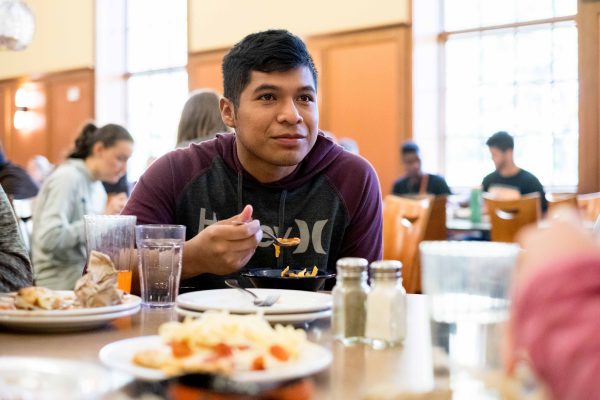
With National Wellness Month coming to an end and an academic year approaching, now is a good time for Kalamazoo College students to consider how they will maintain their physical, mental, emotional, spiritual, social and environmental well-being when they’re on campus.
One element to consider within that wellness spectrum might surprise some: food balance. And dietitian Gretchen Kauth is available to assist K and Western Michigan University students with their strategies.
“Food isn’t just critical to our physical health, it’s also a large part of our emotional health,” Kauth said. “Students come to me because they’d like to start being a vegetarian and want to know how to do that healthfully. Or they see me because their blood glucose or their cholesterol is high. They might want to lose or gain some weight. Those are the physically driven reasons. But more and more, especially during the pandemic, students want to know about the emotional part of food. A lot of us were and still are turning toward food as our entertainment, our comfort or our stress management.”
From Kauth’s point of view, “diet” refers to much more than the four-letter word associated with weight goals. Her strategy for assisting students instead addresses the purposes behind our eating to address wellness.
“I think that the traditional sense of how we use the word ‘diet’ usually has to do with weight or weight management,” she said. “I’ve really tried to take a non-diet approach to get away from the numbers and the counting. I want students to really look at the ‘whys’ of what and how they eat and how we can manage emotions without food.”
That’s not to say that food shouldn’t involve enjoyment. Quite the opposite, in fact, and balance is important. Students should have their cake and eat it, too.
“I don’t want to ever deny that food is pleasurable,” Kauth said. “It’s a part of our social world. If we think back evolution-wise, people once ate simply because they were hungry and they knew that eating sustained them. Then there are the reasons people eat as part of traditions and celebrations. Food can and should be a part of those celebrations, but food shouldn’t be the main reason we’re getting together.”
For some people, food can be comforting for emotional needs and helpful in managing stress. But emotional eating, when done too frequently or in large amounts, can create problems.
“I try to get students to think about the ‘why’ rather than always the ‘what’ behind eating,” Kauth said. “Even if we overeat or binge eat something healthy, like carrots—Yes, carrots are a better food to binge on than ice cream, but the behavior is not what we want. To help manage our emotions we need to develop non-food coping strategies – like meditation, yoga, visualization, and in some cases, seeking out a therapist. A healthy diet isn’t just about essential nutrients, fuel and reducing your risk for chronic illness. It’s about understanding our relationship to food and ensuring a healthy balance for physical as well as emotional health.”
Virtual appointments are available at no cost for students on the College’s health insurance or $50 for students with private insurance. Kauth also is planning three free workshops this fall for all K students. “You vs. Illness: Win with a Healthy Immune System” is scheduled for 6:30 to 7:30 p.m. Tuesday, September 28. “Vegetarian Eating: Plants are Powerful” is planned for 7 to 8 p.m. Wednesday, October 6. “Emotional Eating: What Are You Hungry For?” will be from 4 to 5 p.m. Thursday, October 14. Signup for individual appointments or the workshops by emailing Kauth at gretchen.kauth@kzoo.edu.
“If students have been to the doctor and they’ve been referred for follow up, seeing a dietitian is a good thing,” Kauth said. “If you come into school with a chronic illness like diabetes or cystic fibrosis and you’ve never seen a dietitian, for sure come in, because it’s a good idea to get some care here. If you are interested in changing your diet in any way, or if you’re looking at the pandemic and you think you want to improve your immune system, then reach out. Anything that might have to do with your physical or emotional health—When you’re turning to food to manage emotions, that’s a really good time to seek out a dietitian.”

